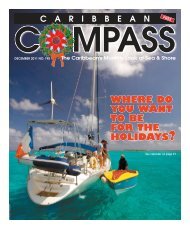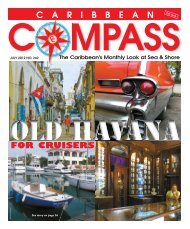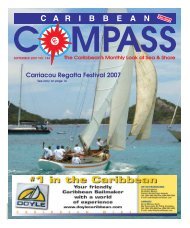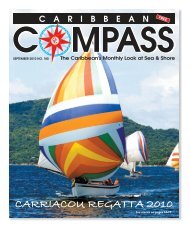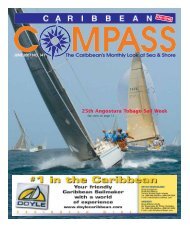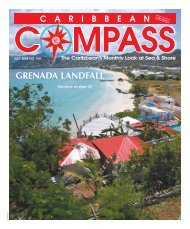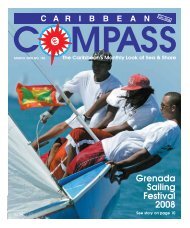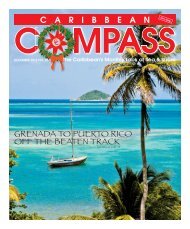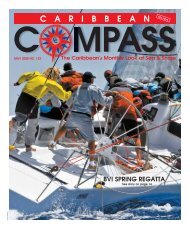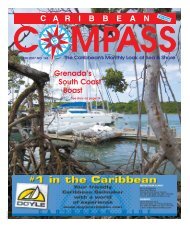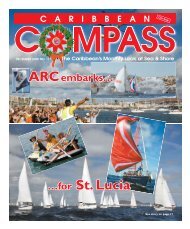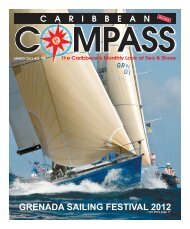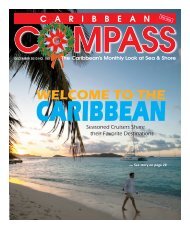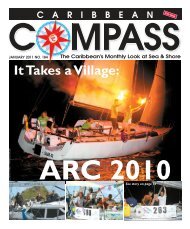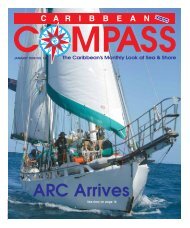You also want an ePaper? Increase the reach of your titles
YUMPU automatically turns print PDFs into web optimized ePapers that Google loves.
JULY 2010 CARIBBEAN COMPASS PAGE 10<br />
On Curaçao there was a need<br />
for an inexpensive Chandlery<br />
without compromising quality and service.<br />
That is how ABC MARINE was born.<br />
ALL YOU NEED FOR BOATING & FISHING<br />
Caracasbaaiweg 158 - Curaçao - Neth. Antilles<br />
Ph (+5999) 461 4476 Fax (+5999) 461 4925<br />
bas@abcboatsnv.com www.abcboatsnv.com<br />
Open Monday - Friday 08.30 - 17.30<br />
Saturday 09.00 - 13.00<br />
CARIBBEAN<br />
ECO-NEWS<br />
Regional Whale Watchers Seek Support<br />
Experts, international whale-watching industry representatives, civil society<br />
groups and international NGOs met at a symposium in Sainte Luce, Martinique,<br />
from February 18th through 21st. The symposium addressed opportunities for<br />
building local, sustainable “blue” tourism and combating threats to marine mammals<br />
in the <strong>Caribbean</strong>.<br />
The Symposium strongly urged <strong>Caribbean</strong> governments to give their full support<br />
and encouragement to whale-watching activities as a valid and sustainable means of<br />
protecting marine mammal populations and creating jobs, earning foreign exchange<br />
and providing sustainable livelihoods for fishermen and local coastal communities.<br />
Whale-watching has become a US$2.1 billion global industry, with whale-watching<br />
as a tourism activity growing in the <strong>Caribbean</strong> and Central American region at a rate<br />
of 12.8 percent (2008), three times more than the growth rate of the global tourism<br />
industry (4.2 percent). Countries in this region are now earning nearly US$54 million<br />
from whale watching as part of their tourism product, while earnings from whale<br />
hunting are minimal. These figures indicate that whale watching contributes to sustainable<br />
development and helps to preserve biodiversity and natural heritage, for the<br />
benefit of fishers and local communities.<br />
The symposium called on all <strong>Caribbean</strong> Governments to ensure that any participation<br />
by them in the International Whaling Commission (IWC) reflects these economic<br />
and ecological realities of the region. The symposium further recalled the principled<br />
position of Dominica’s Prime Minister, Roosevelt Skerrit, for his 2008 decision<br />
to withdraw his government’s support for whaling at the IWC as being “incompatible”<br />
with Dominica’s brand as a “Nature Isle”, and calls on the leaders of other OECS<br />
countries to join him.<br />
The IWC’s 2010 meeting is being held as this issue of <strong>Compass</strong> goes to press.<br />
No Dumping Garbage from Ships in <strong>Caribbean</strong><br />
Decisive action by the Marine Environment Protection Committee (MEPC) of the<br />
International Maritime Organization (IMO) at its 60th Session, held March 22nd<br />
through 26th, has resulted in the adoption of a resolution prohibiting the discharge<br />
of all garbage by ships in the Wider <strong>Caribbean</strong> Region as of May 1st next year.<br />
With the adoption of an MEPC resolution establishing May 1st, 2011 as the date<br />
on which the MARPOL 73/78 Annex V (Regulations for the Prevention of Pollution<br />
by Garbage from Ships) Special Area regulations take effect in the Wider <strong>Caribbean</strong>,<br />
this region becomes the sixth zone to be protected against the discharge of all garbage<br />
from ships, other than organic materials under certain conditions (based on<br />
distance from shore and particle size). This is a very timely move, as maritime traffic<br />
is expected to continue to dramatically increase in the <strong>Caribbean</strong> region with the<br />
expansion of the Panama Canal.<br />
The Wider <strong>Caribbean</strong> Region contains 28 coastal and insular countries that have<br />
coasts on the <strong>Caribbean</strong> Sea, the Gulf of Mexico and part of the Atlantic Ocean. It<br />
covers an area of more than 3.3 million square kilometres, from the United States to<br />
French Guiana. The region’s highly productive but extremely sensitive marine ecosystems<br />
provide a livelihood for many coastal communities and more than 41 million<br />
people live within 10 kilometres of the coastline.<br />
Garbage in the marine environment can damage habitats and kill wildlife, and can<br />
also impact the quality of life of local communities and affect the economies of a<br />
region, notably by its consequences on tourism.<br />
A study conducted by the United Nations Environment Programme (UNEP) assessed<br />
that litter from ocean-based sources of pollution (such as fishing nets, gear and supplies,<br />
ropes, etcetera) accounted for at least 11 percent of all marine litter in our region.<br />
Chris Corbin, UNEP <strong>Caribbean</strong> Regional Coordinating Unit Programme Officer for<br />
Pollution Prevention, congratulated the countries for their collaboration on this matter,<br />
but also stressed the importance of having the entry into force as soon as possible<br />
of the related pollution control agreement for Land Based Sources of Marine<br />
Pollution. This will further assist efforts to tackle the problem of solid waste and<br />
marine litter in the region.<br />
Big Fish Lacking in Big Pond<br />
Sharks, barracuda and other large predatory fishes disappear on <strong>Caribbean</strong> coral<br />
reefs as human populations rise, endangering the region’s marine food web and<br />
ultimately its reefs and fisheries, according to a study by Chris Stallings of the<br />
Florida State University Coastal and Marine Laboratory.<br />
While other scientists working in the <strong>Caribbean</strong> have observed the declines of large<br />
predators for decades, the comprehensive work by Stallings documents the patterns<br />
in far more detail at a much greater geographic scale than any other research to<br />
date. His article on the study, “Fishery-Independent Data Reveal Negative Effect of<br />
Human Population Density on <strong>Caribbean</strong> Predatory Fish Communities”, was published<br />
in the May 6th, 2009 issue of the journal of the Public Library of Science<br />
(www.plosone.org).<br />
—Continued on next page<br />
NOAA



